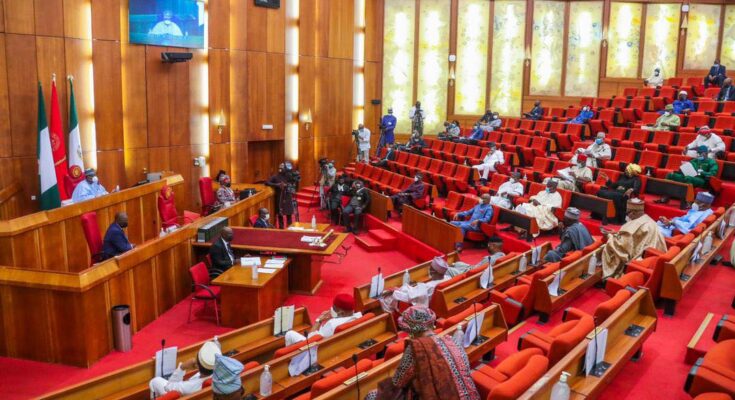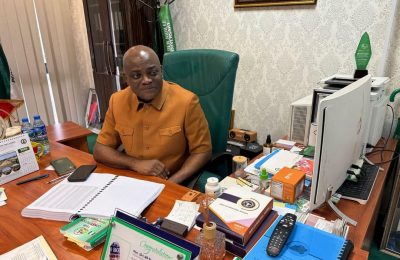Senators-elect and Members-elect have been warned to desist from accepting bribes in the course of discharging their statutory responsibilities in the 10th Assembly.
Dr. Adetunji Ogunyemi, acting Professor of Economic History from Obafemi Awolowo University (OAU) gave the charge during the paper presentation titled: ‘Parliamentary immunities, privileges and code of ethical conduct’ organised by National Institute for Legislative and Democratic Studies (NILDS) for all the returning and newly elected National Assembly members during the 2023 general elections and Supplementary elections conducted across the country.

He also informed all the Members-elect on the need to abide by the 14 provisions stipulated in the Code of Conduct Bureau and Tribunal Act, that “all public officers in Nigeria shall not neglect, refuse or fail to abide by.”
Dr. Ogunyemi who read the Riot Act to the incoming lawmakers warned against any act that could bring the Parliament to disrepute during the 10th Assembly, explained that the Code of Conduct and Tribunal Act prohibits any act relating to “accepting of bribes or obtaining or attempting to obtain or receive bribes for self or any member.”
Speaking further, he noted that despite the latitude given by the Freedom of Information (FOI) Act which enable Nigerians access to obtain information from any public establishments including National Assembly, issues bothering on the President’s health is prohibited from being divulged.
According to him, “Freedom of Information can be exercised not only by the Press as it is erroneously thought. But that any Nigerian who feels concerned to request for information.
“It may be from National Bureau of Statistics, it may be from Public Accounts Commmitee of the House, it may be from the hanzard records, verbatim records of the House that are produced in any sitting…but he must request for it.
“And his request must not be within the prohibited environment and that is for example, information relating to the health and condition of health of the President, it is prohibited.
“It’s outside the tenure of what can be requested for.
“The reason is that it’s protected by another law which is the law of confidentiality within the profession of medical doctor or a Lawyer,” he noted.
He averted that, it is not an error that the drafters of the Constitution mentioned Legislature as the first organ to be mentioned in the hierarchy of powers, as encapsulated in section 4 of the 1999 Constitution (as amended), followed by the Executive arm and Judiciary in sections 5 and 6 of the 1999 Constitution (as amended).
“To show that the hierarchy of powers that are vested in the Federation indeed is the Legislature and not the Executive,” Dr. Ogunyemi noted.
He also informed the Members-elect on the extant laws which guaranteed their immunity in the course of discharging their legislative functions, adding that similar “immunity extends even to the officers and all other support staff if the National Assembly. They shall be protected and shall not be assaulted in the course of their duties. It gives it to the Legislature.
“All provisions on Appropriations powers and privileges are codified in section 47 to 52 of the same Constitution,” he noted.
He also warned that any lawmaker sha not be allowed to enter into the chamber or the gate of the National Assembly, after such a member has been found culpable of contempt of the House.
In his earlier presentation titled: ‘Constitutional powers of the Nigerian Legislature’, the NILDS’ Director Legal Services, Dr. Shuaibu Danwaka disclosed that the Legislature has the express powers to make make laws for the peace, order and good government of the Federation or the State as encapsulated in sections 4(2 &7), among others.
He added that the Parliament is also endowed the powers and control over public funds; Establishment of consolidated revenue fund (sections 80 and 120); Authorization of expenditure from consolidated revenue fund (sections 81 and 121); Authorization of expenditure in default of appropriation (sections 82 and 122); Establishment of contingencies fund (sections 83 and 123); Power to determine remuneration of the governor and other certain officers (sections 84 and 124); Power to confirm appointment of Auditor-General of State (sections 86 and 126); Power of investigation (sections 88, 89, 128 and 129). “Power to checkmate the executive (sections 143, 144, 188 and 189); Power to prescribe the number of judges of a State high court, number of Khadis and Judges of the Sharia and Customary Courts of Appeal (section, 270, 276 and 280).
He also underscored the need for National Assembly members on the need to develop a sound political will that facilitates exercise of constitutional powers beyond ethnic or tribal affiliation with some measure of undiluted patriotism.
Dr. Danwaka also stressed the need to grant financial autonomy improved and regulated Legislature — Executive relations; improved legislative capacity through a combination of provision of capacity development services and exchange of experience visits; embark on mass public awareness; dynamic rules of practice and procedure that originated from a flexible constitution.







